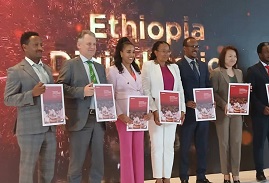Ethiopia’s digital economy could add over ETB 1.3 trillion to GDP by 2028, according to the GSMA’s new report, Driving Digital Transformation of the Economy in Ethiopia.
The report highlights how telecom reforms and investments in mobile technology are catalyzing growth in key sectors such as agriculture, manufacturing, and public services. These advancements are expected to create over 1 million new jobs and generate an additional ETB 57 billion in tax revenues by 2028.
Pioneering Ethiopia’s Path to Digital Growth
“Ethiopia is well- positioned to be a digital leader in East Africa. By implementing strategic reforms and improving access to digital tools and services, Ethiopia can unlock unprecedented opportunities for economic and social development. This will benefit not only the economy but also the millions of Ethiopians who stand to gain from greater digital inclusion,” Angela Wamola, Head of Sub-Saharan Africa at GSMA.
Ethiopia’s telecom reforms under the Home-Grown Economic Reform (HGER) program have driven major progress. By 2023, the sector contributed ETB 700 billion to GDP and generated 57 billion Birr in tax revenues. Mobile internet connections grew by 65%, with 4G coverage expanding eightfold. Key players, Ethio Telecom and Safaricom Ethiopia, have been instrumental in driving this growth through expanded mobile internet access and increased competition in the telecom market.
Key Findings and Economic Impact
By 2028, over 50 million Ethiopians – nearly double today’s figures – are expected to be connected to mobile internet, according to the report. Increased connectivity will drive growth across sectors like agriculture, adding ETB 140 billion, and manufacturing, contributing 114 billion Birr by 2028
However, a substantial usage gap persists, with 76% of the population still not using mobile internet despite living within network coverage. Bridging this gap, particularly the 40% gender disparity in mobile internet use, is crucial for Ethiopia’s digital future. With targeted policy reforms, this gap could shrink to 66% by 2028, bringing millions more Ethiopians online.
Mobile Money and Financial Inclusion
Mobile money, with 90 million registered accounts and 70% penetration, is a crucial driver of financial inclusion. As these services grow, they will play an increasingly important role in boosting both digital and financial inclusion, further contributing to the country’s economic development.
Key Policy Recommendations to Accelerate Ethiopia’s Digital Transformation
To fully harness the potential of digitalization in Ethiopia, the GSMA outlines several critical policy recommendations, including:
1. Prioritise service affordability —Reducing sector-specific taxes will go a long way toward addressing the affordability of mobile service in Ethiopia.
2. Fast-Track Telecom Reforms: Streamline Rights of Way and planning approvals to accelerate infrastructure development.
3. Improve Device Affordability: Reducing taxes and customs duties on mobile devices will help make smartphones more affordable for low-income households, enabling more Ethiopians to access mobile internet services.
4. Expand Mobile Money Services: Strengthening regulatory support for mobile money services is essential to boosting financial inclusion. Ethiopia has already made significant strides, with over 90 million registered mobile accounts by 2024.
5. Boost Digital Skills and Government Services: Supporting digital literacy and expanding e-government services will help increase adoption of digital technologies, particularly among underserved communities such as rural populations and women.
Empowering Ethiopia’s Future through Connectivity
Digitalization is key to advancing Ethiopia’s Vision 2025. Mobile technologies will boost productivity in agriculture and other sectors, creating new opportunities across the country.

